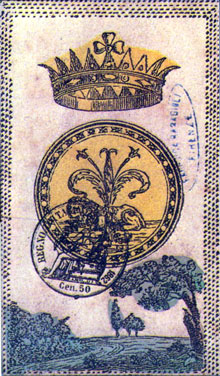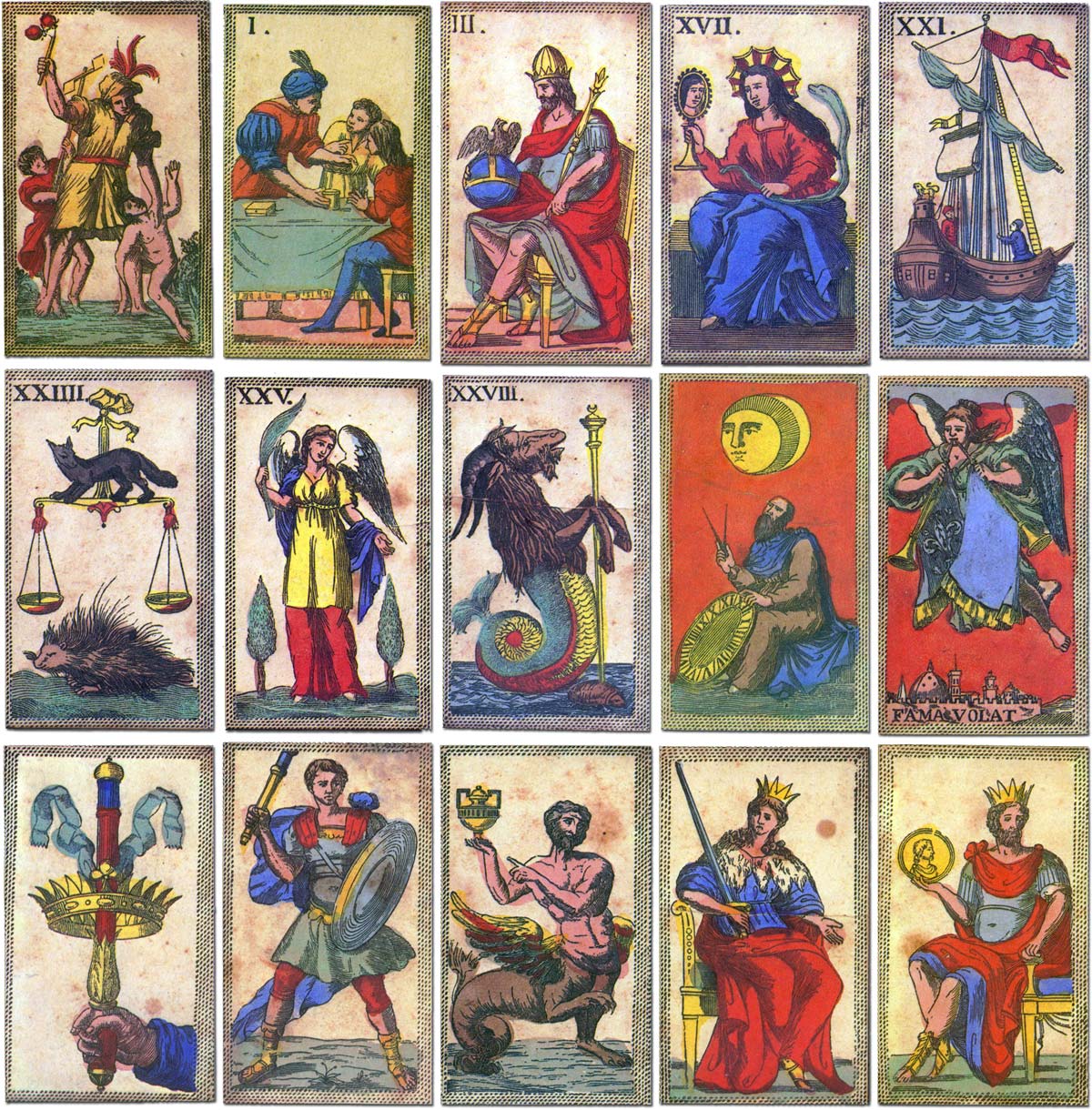Minchiate Fiorentine
The Florentine game of Minchiate is played with a pack of 97 cards. The subjects and arrangements of the trumps are slightly varied and their number increased to 41 by the addition of the three theological virtues, one of the cardinal virtues (Prudence), the 4 elements and the 12 signs of the zodiac.

Minchiate Fiorentine (Florence), 1850
Florentine Minchiate is played with a pack of 97 cards. The subjects and arrangements of the trumps are slightly varied and their number increased to 41 by the addition of the three theological virtues, one of the cardinal virtues (Prudence), the 4 elements and the 12 signs of the zodiac. The subjects of the last 8 trumps are relieved on a red background.
In the numeral cards the Cavalli are monsters with human heads and of the four Fanti two are warriors and two servants. Also the Spade and Bastoni suit symbols differ in form from those of the Tarocchi pack, the former being weapons of the conventional military pattern, crossed diagonally; and the latter short batons. These beautiful cards have an old world look and feel to them and are made of sturdy card stock (matte). The original etchings were painted by hand.
Old cards manufactured in Italy usually had a fanciful decoration on the backs, the paper folded over to the front to form a border. Many modern decks still imitate this effect.

Above: Minchiate cards originally published in Italy in 1850 and published as a facsimile by Il Meneghello in 1986. Minchiate is an expansion of Tarot that most likely dates back to the sixteenth century. Minchiate differs from the typical Tarot deck by having 41 Major Arcana cards rather than 22. Like the Tarot, there are 56 Minor Arcana (16 Court cards, and 40 Pips), making a total of 97 cards in the deck. Card size: 3 3/4'' x 2 1/4 inches, 9.53 x 5.72 cm.
See also: Etruria Minchiate

By Simon Wintle
Member since February 01, 1996
Founder and editor of the World of Playing Cards since 1996. He is a former committee member of the IPCS and was graphics editor of The Playing-Card journal for many years. He has lived at various times in Chile, England and Wales and is currently living in Extremadura, Spain. Simon's first limited edition pack of playing cards was a replica of a seventeenth century traditional English pack, which he produced from woodblocks and stencils.
Related Articles

Lyon pattern made in Italy by Pietro de Santi
The Lyon pattern was initially developed in France during the 16th century. As Lyon was a trading hu...

Laurenzo Propagine
Spanish-suited cards made in Italy by Laurenzo Propagine.

Il Tarocco Mitologico
Fully pictorial Tarot designed by Amerigo Folchi with figures mainly from Greek mythology.

Neapolitan pattern by Luigi Pignalosa, Naples
Two versions of the Neapolitan pattern from the British Museum by Luigi Pignalosa, Naples, 1875 & 18...

Dylan Dog
Characters and objects from the Italian comic book series Dylan Dog, written by Tiziano Sciavi and d...

Royal Britain
Pack devised by Pietro Alligo depicting English monarchs from Alfred the Great to Elizabeth II.

Le Monde Primitif Tarot
Facsimile edition produced by Morena Poltronieri & Ernesto Fazioli of Museo Internazionale dei Taroc...

I Tarocchi del Buongustaio
A less-than-serious set of major arcana on a gourmet theme, with designs by Cosimo Musio.

Poker Lusso
Richly costumed courts on a luxury poker pack from Masenghini.

Pinocchio playing cards
Comic book drawings inspired by Carlo Collodi’s children’s classic, Pinocchio.

Le Ore playing cards
Caricatures of famous personalities from the late 1970s for the Italian magazine Le Ore.

Carte Romantiche Italiane
Scenes of life and the theatre in Milan towards the second half of the 19th century.

Lo Stampatore
‘Lo Stampatore’ linocut images created by Sergio Favret, published as a deck of cards by Editions So...

Leonardo collection
Leonardo collection playing cards with drawings from his notebooks.

Lo Cartescacco / Chess playing cards
Playing cards designed by F. Romagnoli bringing together Chess and Bridge, Italy, c. 1981.

Il Vostro Destino
Italian fortune-telling pack produced by Viassone and later by Masenghini.
Trending Articles
Popular articles from the past 28 days


